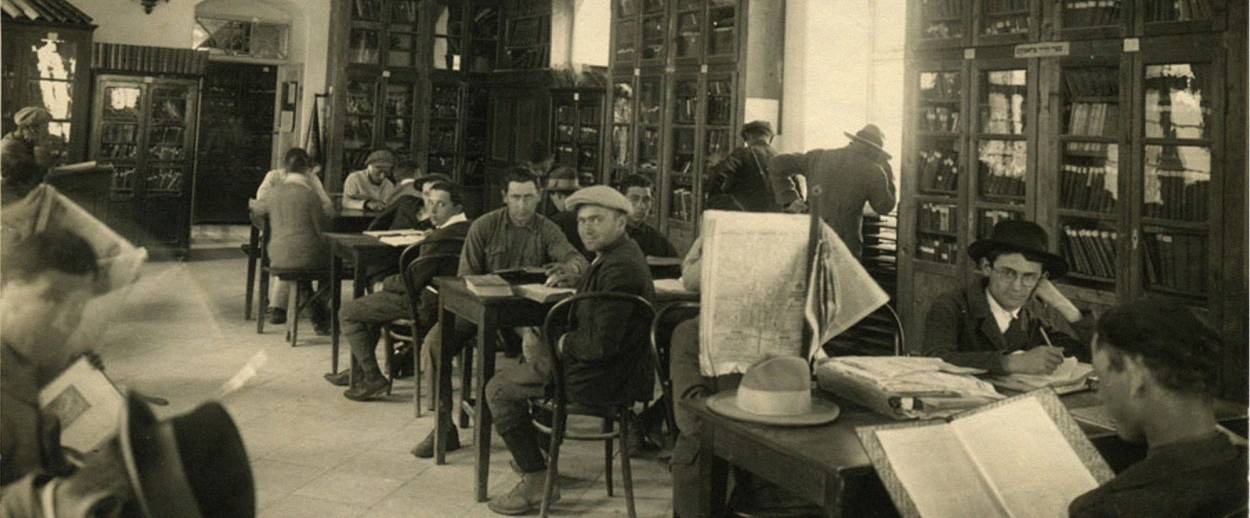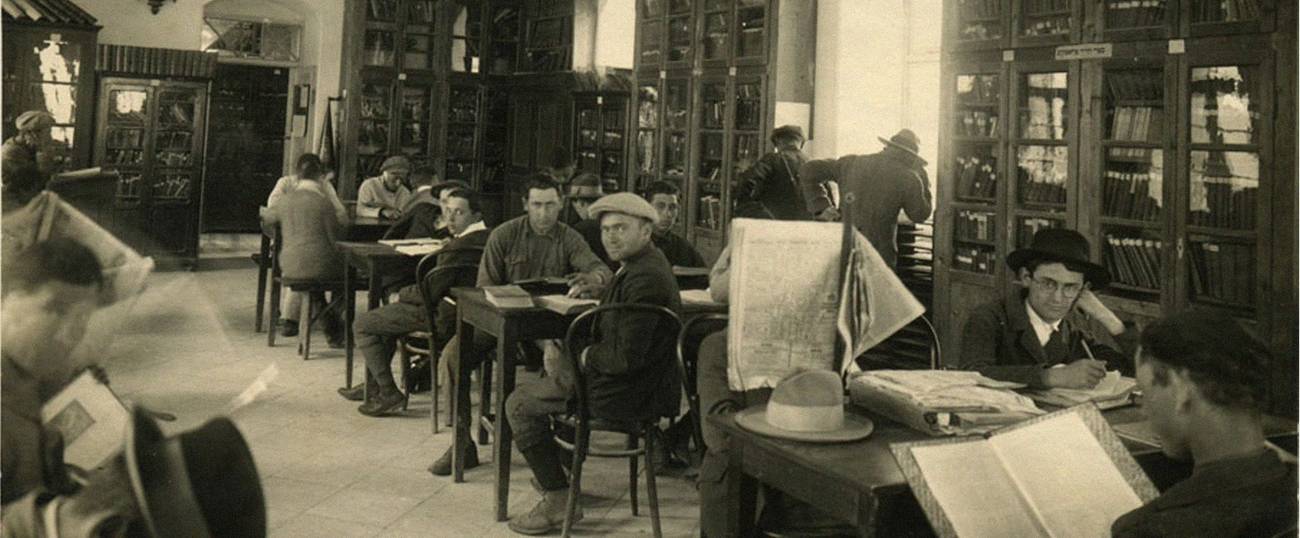The Coolest Place in Jerusalem? It’s the Library.
Featuring anything from Maimonides’ manuscripts to decades of Hebrew rock music, the National Library of Israel is suddenly bringing in the crowds




The notebook isn’t much to look at, just plain thin sheaths yellowing with age held together by a tattered blue brittle cover, half-torn. Inside, the diligent student wrote carefully, translating words from German to Hebrew, the letters large and round like half-crescents: Innocent. Suffering. Painful. Disgust. Terrifying. Fragile. Genius. It’s the sort of vocabulary only Franz Kafka would find indispensable.
The notebook, now one of the many treasures of the National Library of Israel, arrived in Jerusalem courtesy of a teenager named Puah Ben-Tovim. In 1921, Ben-Tovim, fresh out of high school, got a job cataloging German-language books in the Library in Jerusalem, working for its director, the celebrated philosopher Samuel Hugo Bergman. Ben-Tovim had academic aspirations, and Bergman suggested that she travel to Prague and stay with his mother while pursuing her graduate degree. In Europe, Ben-Tovim met the young Kafka, a friend of the Bergman family. He wanted to study Hebrew, not the liturgical kind studied in Europe but the livelier sort spoken in Palestine. Realizing precisely what sort of mind writhed in her student’s skull, Ben-Tovim assigned him a novel by the great Hebrew writer Y.H. Brenner, titled Bereavement and Failure and following the travails of a young and mentally ill man as his life falls apart. Kafka was naturally enthralled, and took to his notebook to memorize the words he found most appealing.
The anecdote—one part intimate encounter, one part literary curiosity, one part spiritual pursuit—perfectly captures the charms of the Library, currently nestled in the Hebrew University’s Givat Ram campus. Enter the room holding Gershom Scholem’s immense collection of books, to give just one example of many, and you’ll find that the librarian’s desk is the very same that used to belong to Scholem himself. Ask nicely, and you may open its small drawers and thumb through notes in Scholem’s own handwriting, left there by the great man and making his work feel more alive than ever.
Until not too long ago, very few people, if any, would stop by to admire Scholem’s desk, Kafka’s notebook, or any of the Library’s other gems. Established in Jerusalem in 1892—five years before the First Zionist Congress first convened to call out for the erection of a Jewish homeland in Palestine—the Library merged with the university in 1925, under Bergman’s capable leadership. After the State of Israel was born, the Library benefited from the bibliophile passions of David Ben-Gurion, Israel’s Founding Father. In 1950, Ben-Gurion wrote to his finance minister and instructed him to generously fund a project to photograph historical Hebrew manuscripts, the state of Israel being, he wrote, “the heir to the Hebrew nation in all of its generations and diasporas.” The Library acquired this collection in the mid-1960s, and continued to grow it. Today, it has more than 120,000 rare early manuscripts from more than 1,000 collections around the world.
This mammoth trove attracted scholars—the Academy Award-nominated Israeli film Footnote, shot on location at the Library, portrays their Talmudic pursuits—but few others bothered showing up. This became particularly true in 1981, when the university decided to move all of its humanities departments to its other campus on Mount Scopus, disconnecting the Library from its natural constituency. Realizing that an institution visited by so few could hardly survive, let alone thrive, the Library convened a committee of international experts in 1996, whose members included the Chief Librarian of the Library of Congress and the Librarian of the Oxford Bodleian Libraries. “In effect,” wrote the experts when they submitted their report two years later, “the Library must be reborn. Only then will it achieve its place as a matrix of creative, cultural, and scholarly activity proper to the People of the Book.”
A master plan was soon hatched, focusing on two main features: digitize as much of the collection as possible, and make the Library attractive to the public at large. With the sort of enthusiasm that only people who decided to dedicate their lives to the preservation of books can muster, the Library’s team set up to meet these goals, exceeding in both cases: The efforts to digitize the collection delivered such treats as JPress, a searchable archive of historical Jewish newspapers; and in 2015, more than 150,000 people visited the Library, attracted by a robust public programming and frequent exhibitions of its greatest treasures. As it collects Hebrew music as well as publications, for example, the Library is running an extremely popular series moderated by the country’s most celebrated popular music critic, Yoav Kutner, and focusing on icons in Israeli rock.
These events draw hundreds, propelling the Library’s executives to look for a new and bigger home. In April, the Library will break ground across the road from the Israel Museum, in what will eventually be a modern building that will help it further grow both its collection and its role in the nation’s cultural life.
Which is necessary: On any given day, the Library’s halls are dense not only with aging academics hunched over, say, Maimonides’ Commentary on the Mishnah in the author’s own hand, but also with hundreds of school children introduced to its holdings in a playful, interactive way. On a recent visit, for example, gifted students from one of Jerusalem’s Arab schools visited to browse, among other things, the Library’s Islamic collection, one of the largest in the world.
“We are thrilled that this institution, the first modern one built by the Jewish people in Eretz Yisrael, will continue to grow in the 21st century, both online and in its new home in Jerusalem,” said Aviad Stollman, the Library’s Head of Collections. “Being the People of the Book, it’s our mandate to make sure these timeless treasures are available to anyone who wants to enjoy them, and that new generations of readers find a home that moves and inspires them.”
***
Like this article? Sign up for our Daily Digest to get Tablet Magazine’s new content in your inbox each morning.
Liel Leibovitz is editor-at-large for Tablet Magazine and a host of its weekly culture podcast Unorthodox and daily Talmud podcast Take One. He is the editor of Zionism: The Tablet Guide.